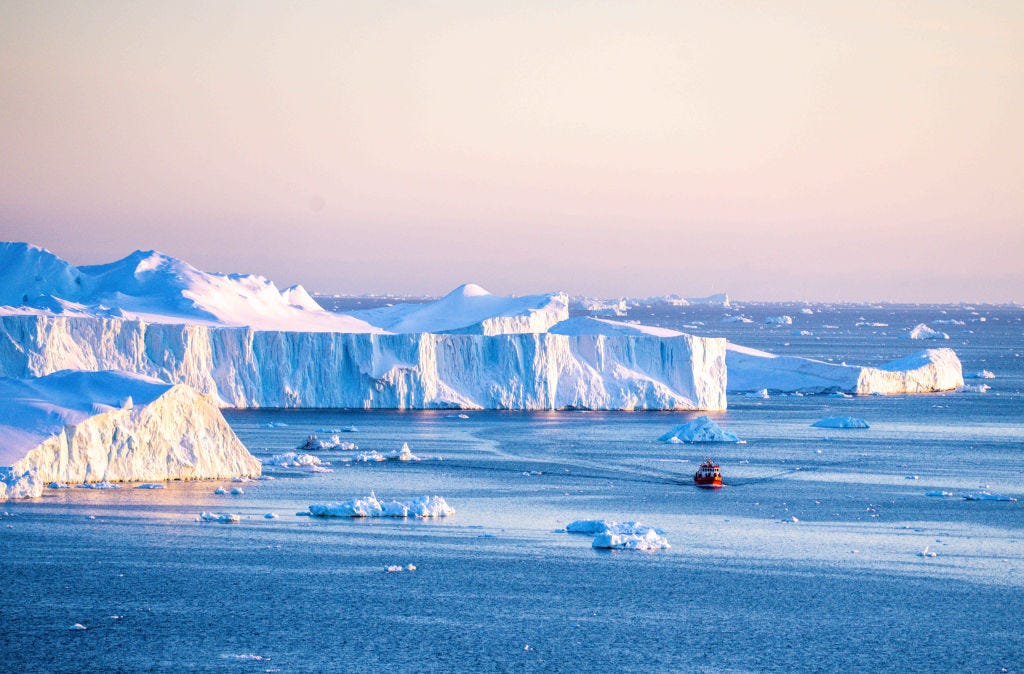A New York Times columnist went to Greenland and discovered fossil fuel talking points

This is a special joint edition of Popular Information and HEATED, a climate newsletter by journalist Emily Atkin. HEATED is a must-read for anyone who cares about the future of the planet earth. Sign up HERE.
Conservative New York Times columnist Bret Stephens has spent years writing columns questioning climate change. So it was a surprise when, earlier this week, he announced that a recent trip to Greenland changed his mind.
In a 6,000-word feature essay, Stephens said he’s now convinced that the ice sheets are melting due to human-caused warming. After speaking with scientists, risk assessors, and policy experts, he said he believes climate change, like cancer, is “manageable or curable in its earlier stages, disastrous in its later ones.” He wrote: “Global warming is a fact. So is the human contribution to it. So are observed increases in temperature and sea levels.”
It was a remarkable transition for someone who previously described climate change as a “mass hysteria phenomenon” and falsely claimed that “much of the science has been discredited.” But Stephens did not apologize for spreading those falsehoods, or for any of his previous misleading remarks about the crisis.
Instead, Stephens tried to convince his readers that, following his come-to-Jesus moment on climate change, he now knows how to solve the problem. His approach to climate, however, is virtually indistinguishable from fossil fuel companies.
Stephens said climate change should be solved by the market, not the government. He chastised activists for“alarmist” rhetoric, arguing humanity will be able to adapt. He criticized the “limitations” of clean energy, and emphasized the benefits of fracking and natural gas to lower emissions. He suggested that many people who want to address climate change do not "accept economic growth as a benefit.”
To come to these conclusions, Stephens ignored many of his own sources who told him climate change would be catastrophic. For example, oceanographer Josh Willis of NASA’s Jet Propulsion Laboratory told him that scientists could not predict the “upper end” of sea level rise by 2100. Willis said it “hopefully less than seven or eight feet" but cautioned that we don't know "just how fast the ice sheets can melt."
Stephens took this to mean that the upper limit of sea level rise is, in fact, 8 feet. This would literally annihilate the world’s coastal cities, home to hundreds of millions of people. Still, Stephens wrote:
On the face of it, that sounds manageable. Even if sea levels rise by eight feet, won’t the world have nearly 80 years to come to grips with the problem, during which technologies that help us mitigate the effects of climate change while adapting to its consequences are likely to make dramatic advances?
Even the man who invited Stephens to Greenland is not convinced. In an interview, Oceanographer and author John Englander said that while he was “very pleased” that Stephens “acknowledged the ways he might have been shortsighted” about the climate crisis, “I would like him to acknowledge the probabilities and the devastation a little more.”
“Usually, when I’m giving a presentation, most people come to understand that it’s a certainty that the ice sheets will melt to the point where global sea level is 5 to 10 feet higher,” he said in an interview. “[Stephens] accepts this, but it’s still a worst-case scenario in his mind … I wish he had been a lot stronger.”
The Times marketed Stephens’ piece as if it were a fresh and important new approach to tackling climate change. In reality, it is a collection of discredited talking points from the fossil fuel industry, and a prime example of delay discourse.
Delay discourse, as defined by scientists, are talking points that “accept the existence of climate change, but justify inaction or inadequate efforts.” It has been branded “the new denial” by, ironically, The New York Times – and it is the fossil fuel industry’s favorite way to pretend they care about climate change while continuing to pollute as long as possible.
Here are a few ways Stephens’ rhetoric mimics the fossil fuel industry’s delay discourse.
The market will solve everything
Stephens’ core thesis is that his trip to Greenland "changed my mind about climate change while reinforcing my belief that markets, not government, provide the cure."
This is a core argument made by the oil and gas industry, through their primary lobbying group, the American Petroleum Institute (API). In a 2016 tweet, API asserted that "[m]arket forces can achieve our nation’s energy, climate & econ[omic] goals better than gov[ernment] mandates."
In a Facebook ad last year, API asserted: "America’s energy leadership has delivered economic growth and environmental progress. But burdensome regulations and anti-industry legislation threatens U.S. national security and global competitiveness."
Stephens makes the exact same argument in his column. The only difference is that the fossil fuel industry didn't have to pay for it.
As "proof" that market forces can address climate change, Stephens cites the history of water use. "In the United States, the difference between total water consumption in 1965 and 2015 is less than 4 percent," Stephens says. "In the same span of time, population grew by more than 60 percent." Stephens attributes that success to farmers who "gradually adopted sprinkler and drip irrigation systems, rather than more wasteful flood irrigation, not to conserve water but because the technology provided higher crop yields and larger profit margins."
What Stephens does not address is that farmers generally source their own water or buy it from the government. So changes that result in less water usage save farmers money, and there is no industry lobbying for excessive water use. The fossil fuel market is completely different. There is a powerful industry that wants to produce and burn as much oil and gas as possible. In the absence of government action, that is exactly what they will do.
Climate activists want to take away everything you love
Stephens writes that any policies related to climate change need to "align with human nature." He argues that phasing out fossil fuels is impossible because you can't have "modern life without plastics, made mainly from the hydrocarbons ethylene and propylene, or steel, made with coking coal and natural gas, or cement or asphalt." Giving up fossil fuels would require millions of people to return to "farming, while accepting a world that can feed far fewer people," Stephens writes.
Stephens says humanity has an "overwhelming and, for now, inescapable dependence on fossil fuels."
The fossil fuel industry is also eager to argue that modern life would be destroyed without oil and gas. Earlier this week, API tweeted that the "natural gas & oil industry helps bring Halloween traditions to life." The group emphasized that "costumes and decorations are made possible through natural gas and oil."
"What can you make from one barrel of oil?" Conocco Phillips asked. "Costumes, masks, wigs, candy buckets and, most importantly, toothbrushes!"
But just as there are renewable alternatives to oil and gas for transportation and electricity, there are alternatives to plastics, including reusable and biodegradeable materials. Many communities, most recently New South Wales, are banning single use plastics. A Halloween without plastic is possible and would not require kids to stop trick-or-treating. (Here is a step-by-step guide.) But Stephens, like the fossil fuel industry, pretends that the choice is between continuing to use fossil fuels and abandoning modern life.
The solution to the fossil fuel problem is more fossil fuels
Stephens argues that if the world wants to get serious about climate change, it should ignore "environmental activists" and produce more natural gas:
[T]he biggest single driver in emissions reductions from 2005 to 2017 was the switch from coal to natural gas for power generation, since gas produces roughly half the carbon dioxide as coal. This, in turn, was the result of a fracking revolution in the past decade, fiercely resisted by many environmental activists, that made the United States the world’s largest gas producer.
Stephens' view on natural gas is virtually identical to the oil and gas industry:
API supports policies that expand the use of U.S. natural gas in both domestic and global markets – and for good reason. U.S. CO2 levels are at generational lows, due in large part to coal-to-natural gas switching in the power sector.
While it's true that natural gas emits less carbon dioxide than coal, presenting natural gas as a solution to climate change ignores the science. According to the latest report from the Intergovernmental Panel on Climate Change (IPCC), between 1850 and 2019, approximately 2,390 gigatons of carbon dioxide were emitted worldwide. That warmed the planet by about 1.1 degrees Celsius. To have a chance to cap total warming at around 2 degrees Celsius, which is necessary to avoid many of the very worst impacts, the IPCC estimates that the world can emit about 1,150 more gigatons.
The point that the IPCC makes clear is that there is no "sustainable" rate of CO2 emissions. Switching from a fossil fuel that emits somewhat less carbon will not cut it. It will still drive us toward the most catastrophic impacts of climate change. Emissions need to go to net zero sooner rather than later.









So Stephens thinks the market will solve everything right? Typical libertarian attitude. The dirty little secret is that governments ARE needed for projects such as these. The fossil fuel (or any industry for that matter) will never approach anything without first seeing if there is a profit in it. No profit, no interest, no activity. Simple as that. How can you monetize climate change should be, why would you want to? If no action is taken, we're all gonna die, profits be damned.
As someone with challenged eyesight and a limited tolerance for right wing cant, I quit trying to read Bret Stephens years ago, but I am grateful for this explication. He still wants it both ways—to accept documented scientific research and to hang on to his market ideology. And the New York Times gives him the platform to indulge himself at a great danger to his readers. Maybe your readers would like a book I just read: Off the Edge: Flat Earthers, Conspiracy Culture, and Why People Will Believe Anything by Kelly Weill. Stephens has stepped back from the edge, but his clinging to his competing ideology makes him a threat to those of us living on the coasts, or really anywhere on the planet.